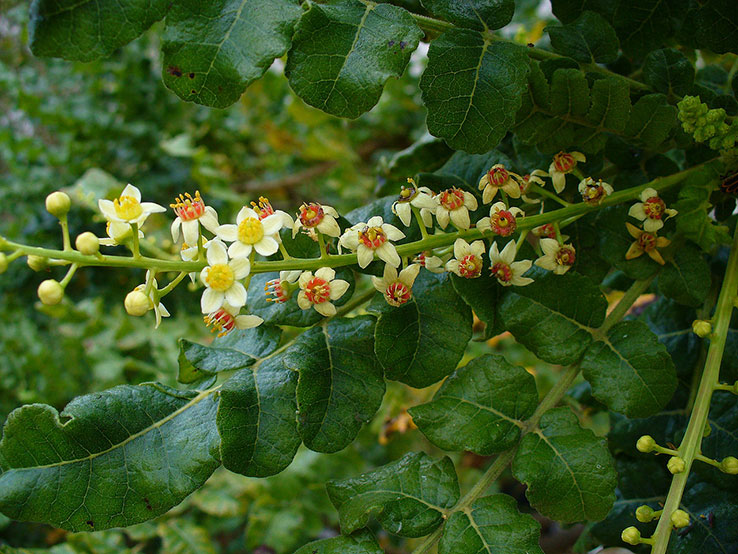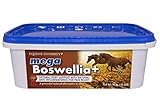Sign up to our newsletter for updates. We earn a small fee from some purchases through product links.
What Are The Benefits Of Boswellia For Horses?

The herb boswellia serrata, also known as frankincense, is an herbal supplement that some pet owners give their horses to help with conditions such as arthritis.
In humans and other animals, boswellia has been found to be effective at reducing inflammation and pain associated with certain conditions.
What is Boswellia?
Boswellia is a herbal supplement derived from the gum resin of the boswellia serrata tree. It’s also known as frankincense, and it’s been used for centuries to treat arthritis and inflammation.
There are few studies of boswellia serrata for horses. But there have been studies of the effect of the supplement on dogs. Here’s what researchers have learned from them:
- Boswellia can help with osteoarthritis in dogs with chronic joint pain. In one study, 93% of dogs had improvement after taking a daily dose for six months.
- Boswellia can help reduce inflammation in dogs—it has anti-inflammatory properties like aspirin does in people.*
- Potent anti-inflammatory mix including Boswellia,...
- Eases acute and chronic pain, especially in horses...
- Safe and natural alternative to Bute and other...
- Encourages freer movement and mobility by reducing...
- Contains ingredients which may alleviate diarrhea...
How does boswellia serrata work?
Boswellia serrata has been used for thousands of years by people all over the world, including Australia, Asia, Africa and Europe. In fact, Boswellia serrata has been used for so long that scientists believe it was one of the first herbs ever cultivated by humans!
The resin contains alkaloids called “boswellic acids” which have anti-inflammatory properties. These boswellic acids may help reduce inflammation caused by arthritis and other conditions like asthma or bronchitis (inflammation of your airways).
The exact mechanism through which boswellia works is not well understood; however, some people believe that it works by inhibiting the enzyme cyclooxygenase-2 (COX-2) — which normally produces prostaglandins that can cause pain and swelling.
How do I give my horse boswellia serrata?
How much to give?
Dosage depends on the horse’s weight, age, and response. In general, you can extrapolate from these guidelines:
1 to 2 grams per day for every 100 pounds (45 kg) of body weight.
For example, a 1000-pound (454 kg) horse would take 1/2 to 1 teaspoon each day; a 1500-pound (680 kg) horse would take 3/4 to 1 teaspoon each day; a 2000-pound (907 kg) horse would take 1-1/4 to 2 teaspoons each day. For smaller animals like ponies and foals, start with half those amounts and work up slowly if needed.
Boswellia serrata comes in powdered and liquid form. You can add it to your horse’s feed or give it orally by syringe or dosing caps. If you decide to give it orally, make sure that your veterinarian is aware of this treatment.
What are the side effects of boswellia serrata?
It’s important to understand that boswellia is safe for most horses, but there are potential side effects associated with its use. It may interact with some medications, so it’s important to talk to your veterinarian before using it if the horse is on any other medications.
Boswellia can make blood thinner, which means that if a horse accidentally takes too much boswellia and begins bleeding from somewhere like the nose or gums, their blood might not clot as quickly as normal. This could be dangerous if the bleeding doesn’t stop quickly enough and causes severe blood loss or injury. You should also take care when giving your horse anything else that causes them to bleed—this includes brushing their teeth too hard or clipping them too close around any wounds on their legs (like after surgery).
If you give your horse boswellia along with another medication that increases stomach acid production (like NSAIDs), there’s an increased risk of stomach ulcers developing since both products are anti-inflammatory agents that work by reducing mucosal secretions in your gastrointestinal tract. Boswellia has been shown to reduce inflammation caused by NSAIDs in horses so they can still be used together without problems; however, it isn’t recommended due to this potential risk factor raised by combining these two drugs together at once instead of one after another (e.g., giving NSAIDs first followed by boswellia).
Another common side effect seen in horses taking large doses of boswellia is diarrhea because this herb contains several compounds known as “diterpenes” which act as mucolytic agents–meaning they help break up mucus secretions throughout various parts of our bodies including those found within our gastrointestinal tract!
It’s important to talk with your veterinarian before giving your horse any herbal supplements. Boswalla can interfere with how your horse’s body absorbs some medications, so it is especially important to talk to your vet if your horse takes conventional medications for inflammation or arthritis. In addition, don’t combine boswellia with blood-thinning medication like aspirin or warfarin unless you are specifically told otherwise by a veterinarian. For arthritis treatment specifically, a licensed veterinarian may recommend a corticosteroid injection, which may be more effective at quickly reducing pain than oral supplements.
Boswellia is a natural product that can be used to treat arthritis and inflammation in horses. It may also help reduce pain, which can be especially important for older horses or those who have suffered injuries that make it difficult for them to move around as they once did.
Boswellia comes from an evergreen tree native to India, where locals have been using it for centuries as part of their traditional medicine practices. The extract from this tree has been shown to have anti-inflammatory properties when taken orally by humans; however, the best way to determine whether boswalla will work for your horse depends on their specific condition and other factors about their diet and lifestyle.
Boswellia and Turmeric
Boswellia and turneric are the same thing. Boswellia is a natural supplement that has been used for centuries to treat arthritis and inflammatory conditions. It’s considered to be safe, but it may cause mild side effects, such as stomach discomfort or heartburn.
Turmeric is an herbal supplement that contains boswellic acid (an extract from boswellia) and turmeric root powder. The product is marketed for its pain-relieving properties, but there isn’t any research showing that it works better than other over-the-counter anti-inflammatory drugs like ibuprofen or aspirin in treating arthritis symptoms.
We hope you have learned about the benefits of boswellia for horses. As with any supplement, it’s important to talk to your veterinarian before giving your horse boswellia serrata. Your vet can help determine if your horse needs this supplement and how much of it is appropriate based on his specific condition.
Home / Health / Horse Feed & Supplements /Last update on 2024-04-25 / Affiliate links / Images from Amazon Product Advertising API

